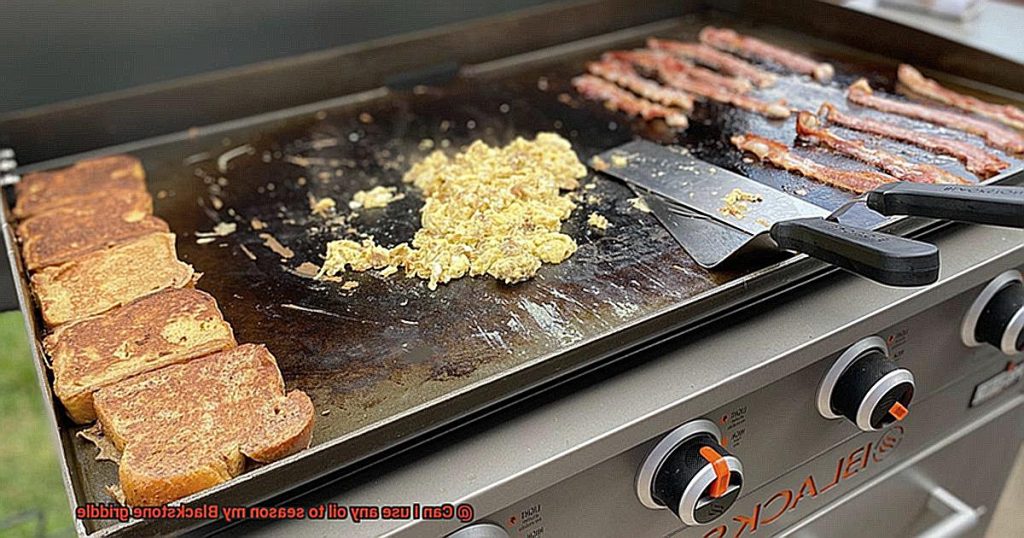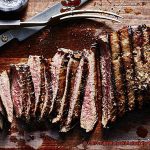Do you find yourself frustrated with food sticking to your Blackstone griddle? You’re not alone. One of the most crucial steps in maintaining a Blackstone griddle is seasoning it with oil. But, can you use just any oil to season your Blackstone griddle? The answer isn’t as simple as yes or no.
While technically any oil can be used to season a griddle, not all oils are created equal. Some oils have a high smoke point, meaning they can withstand the high heat required for griddle cooking. Other oils may not have a high enough smoke point and could burn off, leaving behind a sticky residue that will damage your cooking surface.
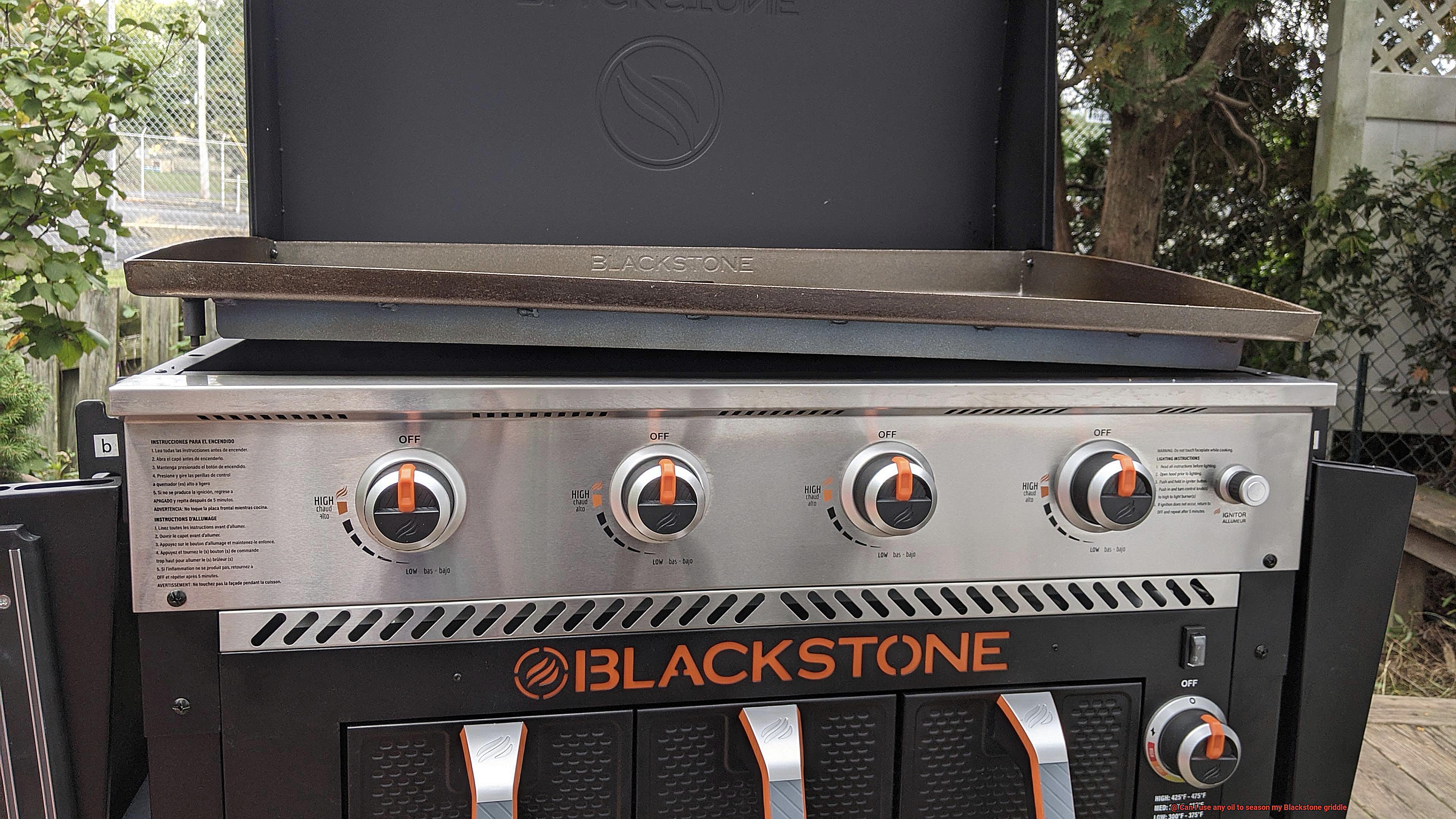
So, what oils should you use to season your Blackstone griddle? The best oils for this task are those with a high smoke point, such as canola, vegetable, grapeseed, and avocado oils. These oils can withstand the intense heat required for griddle cooking while providing your griddle with a protective layer that prevents food from sticking.
In this blog post, we’ll delve into the best oils to use for seasoning your Blackstone griddle and provide some helpful tips and tricks on how to properly season your griddle to keep it in peak condition. Whether you’re an experienced chef or new to the world of griddling, read on to learn everything there is to know about oil seasoning your Blackstone griddle.
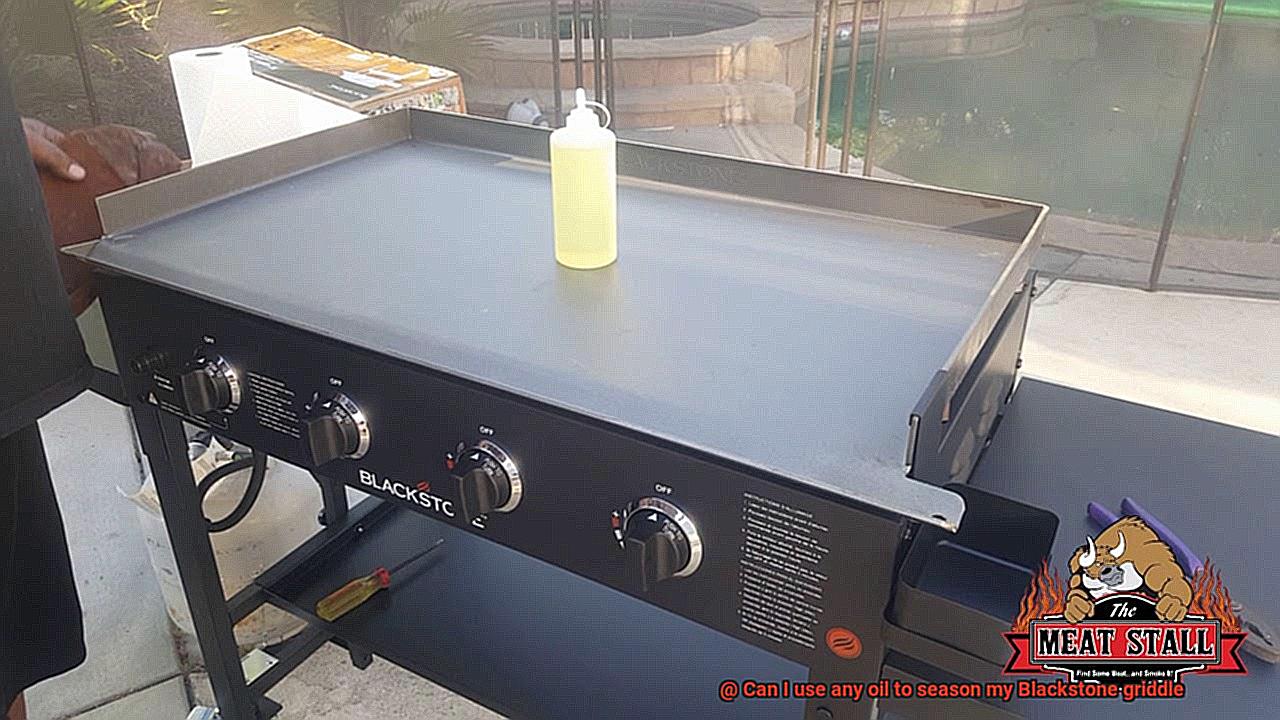
Contents
What is a Blackstone Griddle?
If so, you need to get yourself a Blackstone Griddle. This appliance is specially designed to cook a variety of foods, from pancakes to steaks and burgers. Its large, flat surface made of steel or cast iron is heated by propane or natural gas, enabling it to distribute heat evenly and quickly across the surface.
The Blackstone Griddle is available in different sizes, ranging from small tabletop models to large freestanding units suitable for commercial cooking. It’s also versatile, allowing you to use different cooking styles like grilling, frying, sautéing, and baking.
One key feature that makes the Blackstone Griddle stand out is its ability to be seasoned. Seasoning involves applying oil to the griddle surface and heating it to create a non-stick coating. This coating helps prevent food from sticking and makes cleaning up a breeze.
However, not all oils are suitable for seasoning a Blackstone Griddle. Choosing the right oil is essential for maintaining your griddle’s quality and ensuring that your food tastes great. When selecting an oil, consider its smoke point, flavor profile, and fat content.
Firstly, avoid oils with low smoke points as they emit harmful compounds when heated and can damage your griddle’s surface. Opt for high smoke point oils like vegetable, canola, or grapeseed oil instead.
Secondly, choose neutral-flavored oils like vegetable or canola oil if you don’t want the oil’s distinct flavor to affect your food’s taste. But if you prefer a specific flavor profile in your food, go for oils like olive oil that have distinct flavors.
Lastly, select an oil that is high in unsaturated fats as it prevents it from becoming rancid and causing an unpleasant smell or taste on your griddle.
Why Is It Important to Use the Right Oil for Seasoning Your Blackstone Griddle?
Well, let me tell you – it’s not just about achieving the best cooking results, it’s also about preserving the longevity of your griddle and enhancing the taste of your food.
Firstly, using an oil with a high smoke point is a must. Oils with a low smoke point can cause uneven surfaces on your griddle, resulting in subpar cooking quality. Instead, opt for oils that can withstand high temperatures without burning or smoking excessively. This will ensure that your food cooks evenly and to perfection.
But the type of oil you choose also affects the taste of your food. Strong-flavored oils like olive or sesame oil can transfer their flavor onto your food and alter its taste. Therefore, it’s crucial to choose a neutral-flavored oil like canola if you plan on cooking various cuisines on your griddle.
Not only does the right oil enhance the taste of your food, but it also protects against rust and corrosion. Using an oil with high levels of unsaturated fats, such as vegetable oil, creates a protective barrier that prevents rust and corrosion from forming over time.
What Are the Dangers of Using the Wrong Oil?
The culprit might be the oil you used for seasoning. Using the wrong oil can not only ruin the taste of your food but also cause damage to your griddle and even be harmful to your health.
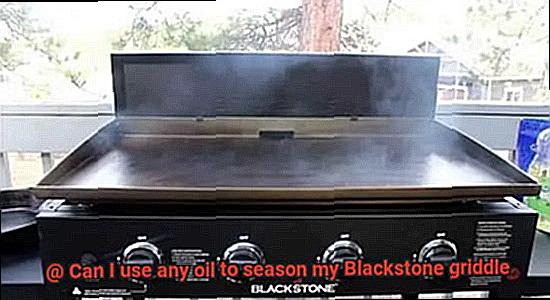
Firstly, low-quality or low smoke point oils can create smoke that infuses into your food, leading to an unpleasant taste. This can be a letdown, especially if you’re cooking for guests. Additionally, using oils with low smoke points on high heat settings can cause hot spots on your griddle. These hot spots can lead to warping or cracking of the griddle surface, rendering it unusable.
Secondly, certain oils can be harmful to your health. Oils with high levels of saturated fats can increase cholesterol levels and contribute to heart disease. Moreover, some oils contain harmful chemicals that can release toxins when heated at high temperatures.
To avoid these dangers, opt for oils with high smoke points such as vegetable, canola, avocado, or grapeseed oil. These oils won’t burn easily and create a non-stick surface on your griddle. Plus, they are healthier alternatives to oils with high levels of saturated fats or harmful chemicals.
What Are Some Good Oils to Use for Seasoning Your Blackstone Griddle?
But with so many oils on the market, it can be challenging to choose the right one for your griddle. Fear not, as I’ve done the research to help you find the best oils for seasoning your Blackstone griddle.
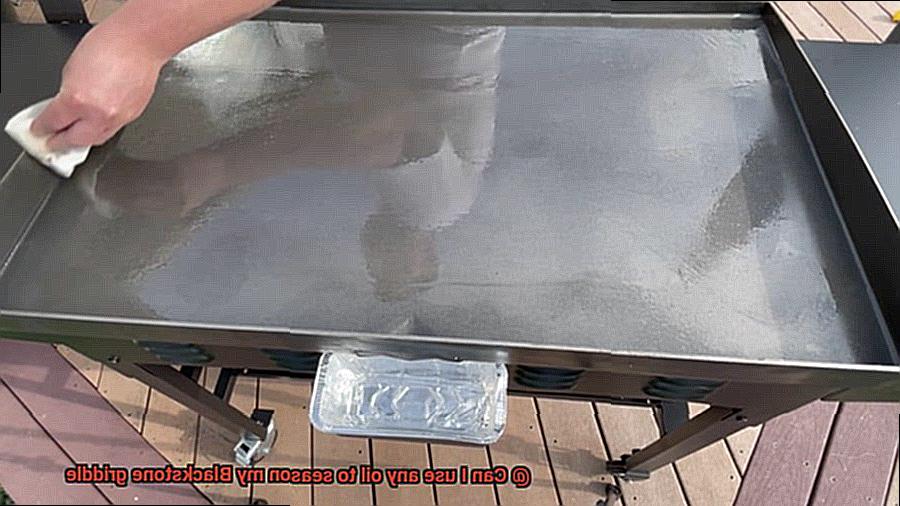
The top three oils recommended for seasoning your griddle are vegetable, canola, and flaxseed oils. These oils have high smoke points and are rich in polyunsaturated fats that create a non-stick surface on your griddle. Vegetable oil is an affordable and popular option because of its neutral taste and easy application. Canola oil has similar properties to vegetable oil but contains less saturated fat. Flaxseed oil is considered the gold standard because it creates an incredibly durable non-stick surface.
Don’t limit yourself to these three options though. Avocado oil, peanut oil, and grapeseed oil are also excellent choices for seasoning your griddle because of their high smoke points. However, keep in mind that some of these oils may have a distinct flavor that could impact the taste of your food.
When selecting an oil for your Blackstone griddle, remember to choose one with a high smoke point and polyunsaturated fats. These properties are crucial in creating a long-lasting non-stick surface on your griddle. Avoid low-quality oils that can ruin your cooking experience.
How Do You Know Which Oil Has a High Smoke Point?
Firstly, let’s talk about what a smoke point is. It’s the temperature at which an oil starts to smoke and break down, releasing harmful compounds and producing a burnt flavor. This can ruin your seasoning process and affect the taste of your food. Therefore, choosing an oil with a high smoke point is crucial.
So, how do you know which oil has a high smoke point? Generally, oils with higher levels of saturated fats have higher smoke points. This is because saturated fats are more stable and less likely to break down when exposed to heat. Here are some examples of oils with high smoke points:
- Avocado oil (520°F)
- Ghee or clarified butter (485°F)
- Coconut oil (350°F-450°F depending on the type)
However, not all oils labeled as “vegetable oil” are created equal. Vegetable oils can be a blend of different oils, some of which may have lower smoke points. Always check the label or do some research before using a vegetable oil to season your griddle.
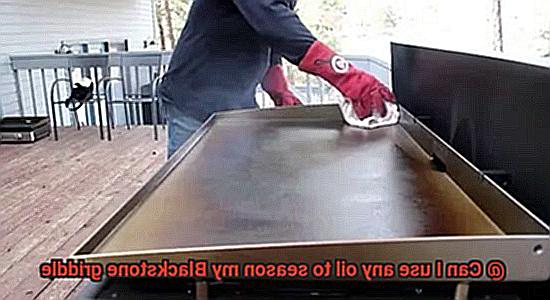
In addition to considering the smoke point, it’s also important to choose an oil that will create a non-stick surface on your griddle. Oils like flaxseed or grapeseed can create a durable seasoning layer that will prevent food from sticking and make cleanup easier.
To sum it up, when choosing an oil to season your Blackstone griddle, consider both the smoke point and the ability to create a non-stick surface. By choosing the right oil, you can ensure that your griddle is properly seasoned and ready for cooking delicious meals.
How Should You Store Your Oils to Ensure Quality and Safety?
In our previous segment, we discussed the importance of selecting the appropriate oil for seasoning your Blackstone griddle. Now, let’s delve into how to store your oils correctly to guarantee both quality and safety.
The first enemy of oils is light and heat. To maintain the flavor and nutritional value of your oils, they should always be stored in a cool, dark place, away from direct sunlight. This means avoiding the windowsill or stove where they can be exposed to heat. For extended freshness, consider storing them in a pantry or cupboard.
Another critical factor to consider is air exposure. Oils should always be kept in airtight containers with tight-fitting lids to prevent oxygen from reaching them and causing them to go rancid faster. Glass bottles or metal containers with screw-top lids are ideal for keeping your oils fresh.
When it comes to oil storage, it’s vital to keep them away from sources of heat and flame as well. Since oils are flammable, they can ignite if they come into contact with a hot surface or open flame. Therefore, avoid storing your oils near the stove or oven.
Lastly, do not forget to check the expiration dates of your oils regularly. Using expired oils can result in off-flavors and potential health hazards. Dispose of any expired oils properly and replace them with fresh ones.
How Often Should You Re-Season Your Griddle?
Then you might be wondering, how often should you re-season your griddle?
The answer to this question is not set in stone as it depends on how frequently you use your griddle and how well you maintain it. However, after thorough research, we have some tips to help you keep your Blackstone griddle in top condition.
Firstly, if you frequently use your griddle, it is recommended that you re-season it every 3-4 uses or whenever you notice the seasoning starting to wear off. This will ensure that your griddle remains non-stick, and your food slides off easily. On the other hand, if you only use your griddle occasionally, once or twice a year should suffice.
Aside from how often you use it, proper cleaning and maintenance also play a crucial role in how often you need to re-season your griddle. By keeping it clean and well-maintained, you can extend the life of the seasoning and reduce the need for frequent re-seasoning.
To store your Blackstone griddle properly, make sure to keep it in a cool, dry place when not in use. Also, don’t forget to cover it up with a protective cover for added protection.
In summary, there is no hard and fast rule for how often to re-season your Blackstone griddle. It all comes down to how frequently you use it and how well you take care of it. By keeping an eye on the condition of the seasoning and regularly cleaning and maintaining your griddle, you’re sure to have a perfectly seasoned griddle for years to come.
Conclusion
To wrap things up, seasoning your Blackstone griddle with oil is a crucial step that shouldn’t be overlooked. However, not all oils are created equal, and it’s essential to choose the right one for the job. Oils with high smoke points like canola, vegetable, grapeseed, and avocado oils are ideal for creating a protective layer on your griddle that prevents food from sticking.
It’s important to note that using low-quality or low smoke point oils can lead to uneven surfaces on your griddle and subpar cooking quality. Moreover, some oils can be harmful to your health. So when selecting an oil for seasoning your Blackstone griddle, consider both the smoke point and ability to create a non-stick surface.
Additionally, proper storage of your oils in cool and dark places away from direct sunlight and heat sources is crucial. As for how often you should re-season your Blackstone griddle, there’s no hard and fast rule. It depends on how frequently you use it and how well you take care of it.
By keeping an eye on the condition of the seasoning and regularly cleaning and maintaining your griddle, you’re sure to have a perfectly seasoned griddle for years to come.

